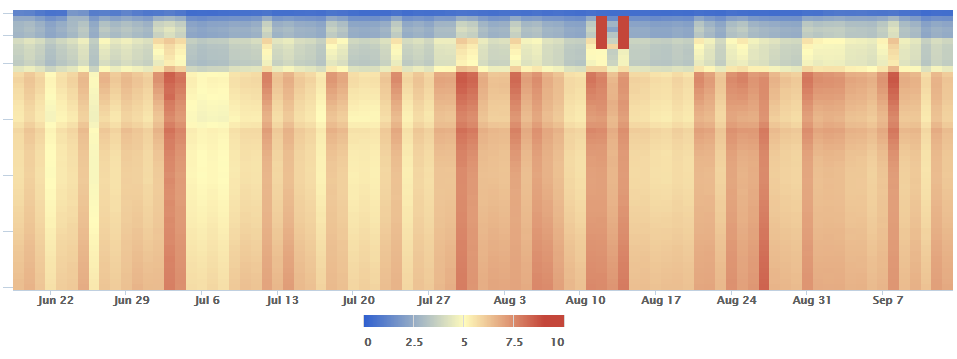
Image: Shows algorithm changes in the serpent (Google search results) – SERP Shakeup Heatmap
Here is the link to ALL Google 2017 Updates >>
What is a Google filter?
In this article, we describe the most common filters.
We have seen many cases where site owners have no idea that their sites would be punished or filtered by Google’s algorithms. Often it’s about thin content or bad links.
Google uses different algorithms and machine learning to show the best results for what users are looking for. There are a variety of Google Filters launched to refine their search algorithm and improve the value of search queries for users. The purpose of Google filter is to improve search results. For those who have a website, there is a risk of being punished in search results if you violate Google’s guidelines. Many SEO companies and web agencies choose not to inform the customer about the dangers of violating Google’s guidelines.
The Google Panda filter hits thin websites
Google Panda algorithm: Punishes poor sites with low content and low quality at the domain level. If you have bad content, you will be penalised according to the pandan and if you improve your content, your site will, at best, increase the number of visitors. Examples of thin content are often found on category pages, tag pages, duplicate content, pages with short descriptions, image galleries without text descriptions or scraped pages, and pages with low content can be sorted out. The Pandan is an ongoing algorithm launched in February 2011 and has followed several updates. Sometimes on a monthly basis.
Google Penguin filter – filters out link spam
Google Penguin algorithm: Google is a link-based tool and the basic idea is that Google measures the link’s power from different sites, which means there are many companies trying to manipulate the results. The penguin filter hits unnatural links and black hat SEO technicians. It was first released in April 2012 and then Penguin was designed to punish sites that use manipulative linking systems to artificially raise their search rank. Link spam was used before that to create a multitude of links – hundreds or thousands – on other sites and it was a technique that worked before the penguin launched the filter. Especially in Sweden, there were many SEO companies who resorted to mass-producing “seo blogs” with unnatural content and sent linkage to customer sites. This method works much worse today and is associated with great risks.
- Penguin 1 2012 on April 24th
- Penguin 2 2012 the 26th of May
- Penguin 3 2012 5th October
- Penguin 4 (Aka Penguin 2.0) May 22, 2013
- Penguin 5 (Aka Penguin 2.1) 4th October 2013
- Penguin 6 (Aka Penguin 3.0) 17th October 2013
- Penguin Everflux – December 10th, 2014 – Many people think it was run continuously
Things that you should generally be careful about are:
- Bad links from link networks
- Over optimised anchor texts
- Sitewide links
- Links from Contnet farms
- Automatic spam links – such as running automated comments
- Bad directories
Google filter Google Real Time Penguins 4.0
The Google Realtime filter will be launched in September 2016, as previously confirmed by Gary Illyes on Google during SMX East conference. When a new penguin filter means that multiple sites can lose a lot of their rankings. You protect yourself best by having a cleaned backlink profile ie you did not try to manipulate the result. If you have no idea what links pointing to your site, check out Google Search Consol.
Mobile Filter
It’s reasonable to believe that mobile-friendly sites get a ranking boost in mobile search – Google shows a slightly different search result when searching for the mobile.
Mobile First April 21, 2015, affected sites that were not mobile and the update was launched at a slow pace. According to the Stone Temple Mobilyeddon Test, nearly 50% of those sites that were not mobile positions in Google search results dropped. In May, the 2nd version of Google Mobile Friendly update launched by Barry Schwartz launched on Search Engine Land.
Other filters
Quality update: Applies to low-quality sites.
The Hummingbird algorithm was an algorithm introduced in August 2013. It takes into account the context of search phrases, synonyms and ensures that the search results are presented with natural language semantic searches.
Other known filters and updates of the algorithm
- Epoch
- Newsworthy content update
- Pigeon the filter
- PayDay filter
- Pirate
- Mugshot
- Knowledge graph extension
- The quality update (Phantom filter) – rolled out at the same time as mobile phone
- Panda 4.2 – 18th July 2015
- Google Hacked Sites Algorithm – October 5, 2015
Determine if a site is stuck in a filter
Start to Determine
If You Lost Traffic in Google If you suspect that you get stuck in a filter, it means you quickly lose rankings. It’s good to first use Google Analytics to deduce which date you’ve lost the rankings and if there were any major changes that have occurred or if it may be due to things you’ve done on the site. If you have lost traffic in connection with any Panda update, it may be that you have thin content on your site.
If you purchased links and suspect that it is due to bad links, you will need to examine the links and see if they look spammy and possibly ask Google to index indexes from bad sites by making a disavow request.
You should also check your outbound links so that the site is not hacked.
It’s not uncommon to lose rankings when changing platform.
There are tools like Google Penalty Checker that you can use to analyse if your site has been adversely or positively affected by an algorithm change. There you can create a free account.
Algorithm changes
If you want to know more about algorithm changes and get alerts when there are major Google algorithm changes, there are several tools.
- MozCast is a utility that displays algorithm changes and it is presented in a similar way as if it were a weather forecast
- https://algoroo.com which is a Google tracking algorithm tool that monitors 17,000 keywords at 100 positions depth.


